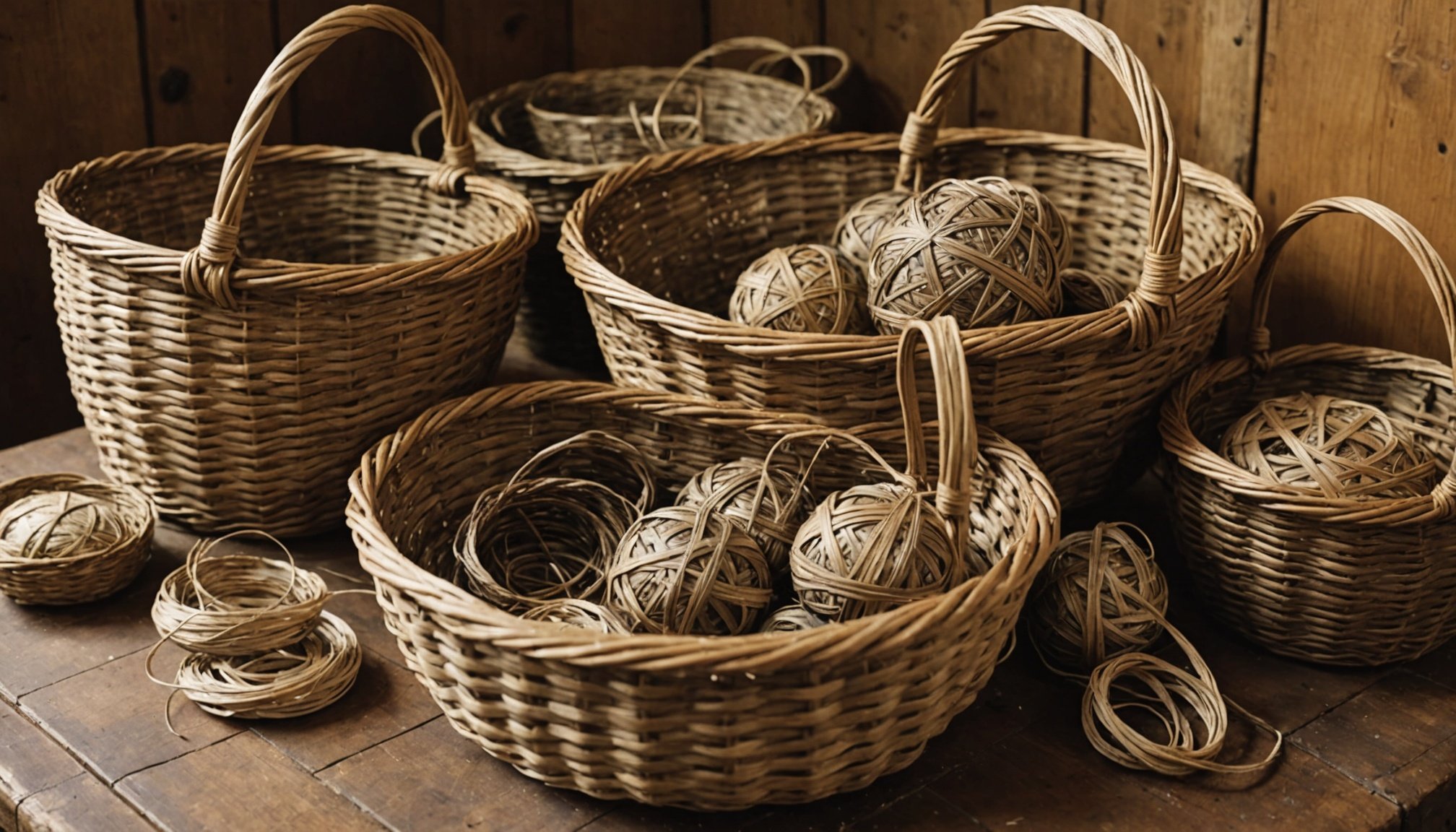Overview of Traditional British Basketry
Traditional British basketry is an ancient craft that has woven its way into the cultural and practical fabric of the United Kingdom. Employing a variety of craft techniques, it represents a blend of historical methods passed down through generations and practiced with precision. The methods primarily include weaving and plaiting natural materials like willow, cane, and rushes, each selected for their unique properties and texture.
In a historical context, basketry played a crucial role in daily life, serving practical purposes across domestic and agricultural spheres. Baskets have been essential for carrying goods, storing produce, and even as containers for fishing. As such, this craft has supported local economies and community sustenance.
In parallel : Unveil Britain’s Top Historical Treasures: Embark on Educational Guided Tours Across the UK
The evolution of basketry in British culture reflects societal changes. With industrialization, the craft faced a decline but has recently seen a resurgence as an artisanal hobby and cultural heritage practice. Workshops and exhibitions celebrate these techniques, ensuring the preservation of this craft. For enthusiasts and newcomers alike, exploring traditional British basketry opens a gateway into understanding the nuances of historical and cultural development through craftsmanship.
Top Destinations for Traditional Basketry Workshops
Exploring the world of UK Basketry Workshops unveils a journey into a cherished craft. For those seeking practical craft experiences in the art of basketry, the Cotswolds stands as a heritage hub that boasts a rich tradition.
This might interest you : Discover Timeless UK Landmarks with Expertly Guided Tours through British Fashion History
The Cotswolds: A Basketry Heritage Hub
In the Cotswolds, numerous workshops capture the cultural significance of basketry. Renowned instructors with deep roots in historical techniques offer insightful classes that blend tradition with hands-on learning. Their expertise ensures that participants connect with the local heritage while perfecting their skills.
Devon: Crafting in the Countryside
Devon offers unique basketry classes that appeal to both seasoned artisans and beginners. The picturesque countryside enhances the learning environment, making basketry classes here a memorable experience. With a focus on accessibility, these workshops cater to diverse needs, ensuring a warm welcome for all.
Yorkshire: Where Tradition Meets Innovation
Yorkshire’s basketry courses embrace both tradition and innovation. Students are introduced to cutting-edge techniques within a historical framework, highlighting the region’s role in evolving the craft. Testimonials from past participants underscore the profound impact of engaging with such transformative learning experiences, rooted in centuries-old practices.
Hands-On Basketry Classes: What to Expect
Embarking on a basketry class promises an enriching basketry class experience. Typically, classes structure themselves by introducing participants to foundational techniques, followed by hands-on practice, which aids in skill development. Beginners might start with basic weaves, while more advanced students delve into complex patterns.
Expect to receive guidance from instructors who bring a wealth of expertise and passion, ensuring that every participant builds the required skills. The focus remains on instructor expertise, which plays a pivotal role in nurturing creativity and precision in your craft. The instructors’ dedication empowers students to explore and experiment, fostering confidence in their abilities.
Hands-on learning is paramount; it cultivates an intimate understanding of various basketry techniques. This experiential approach encourages problem-solving and innovation, vital for mastering the craft. Through tactile engagement, participants learn to appreciate the subtleties of material and technique combination.
Moreover, the interactive nature of these classes provides avenues for creative expression and collaboration among peers. Such environments often lead to shared inspirations, enhancing the overall learning trajectory. This skill development journey unfolds within a supportive community, paving a path toward becoming a competent basket weaver.
Emerging Basketry Trends and Techniques
As interest in traditional British basketry grows, exciting contemporary basketry trends are shaping the craft. Notably, the use of eco-friendly materials has become increasingly prevalent. Craftspeople are now favouring sustainable fibres drawn from locally sourced willow, hemp, and other natural fibres, reducing environmental impact and promoting sustainability.
In parallel, new basketry techniques are evolving, offering a fresh twist on familiar practices. Basketry artisans are experimenting with unconventional shapes and complex patterns, blending age-old methods with innovative designs. A notable trend is the integration of mixed media, where traditional and modern materials are combined to create striking contemporary pieces.
Design trends also reflect broader cultural shifts. Minimalistic and functional designs are gaining popularity alongside more elaborate and decorative creations. This duality allows basketry artists to appeal to diverse aesthetic preferences.
Workshops and exhibitions across the UK facilitate knowledge-sharing and skill enhancement for all skill levels, ensuring that traditional basketry remains both vibrant and relevant. These evolving craft techniques enable crafters to innovate while preserving significant historical craftsmanship, ensuring its continuity for future generations. This intersection of tradition and progress underscores the dynamic nature of basketry today.
Booking Information and Accessibility
When planning to attend basketry workshops across the UK, understanding the booking process ensures a smooth experience. Most workshops offer online booking systems that allow participants to reserve their spot easily. Early booking is advisable due to the popularity of these unique craft experiences.
In terms of accessibility, many workshops strive to accommodate individuals with disabilities. Check with the individual workshop providers for specific accessibility options, including venue facilities like wheelchair access and assistance options. Some workshops offer tailored sessions or have adapted tools to aid participants with different needs.
Considering costs is also crucial. On average, workshop booking fees range based on the complexity and length of the courses. Basic classes might start at around £50, including materials, while intensive courses or those with esteemed instructors can cost upwards of £200. Investigating whether accommodations are included or require separate arrangements is worthwhile, especially for multi-day events.
With a growing interest in basketry, these classes not only provide a cultural educational journey but are also a practical way to immerse oneself in this traditional craft. For specific information, contact the workshop organisers directly for the most accurate and detailed arrangements.
Additional Resources and Reading
Basketry enthusiasts seeking to expand their knowledge can explore a range of resources tailored to enhance their understanding and skills. Dive into a rich selection of books on basketry that cover everything from basic techniques to intricate patterns. Notable titles include “The Craft of Basketry: A Beginner’s Guide” and “Woven Art: Innovative Techniques in Basketry,” which are excellent starting points for learners at different stages.
For those keen on flexible learning, online courses provide structured guidance. Websites like Craftsy and Domestika offer in-depth modules taught by seasoned artisans that allow learners to advance at their own pace. Each course typically includes comprehensive video sessions, downloadable patterns, and forums for interaction with instructors and peers.
Apart from textual resources, video tutorials offer a visual gateway to advanced crafting techniques. Platforms such as YouTube host numerous free tutorials, enabling learners to visualize and practice various styles conveniently from home. For a blend of interactive and collaborative learning, virtual workshops present an opportunity to engage with instructors and fellow students in real-time, often culminating in the creation of a complete handcrafted piece.







